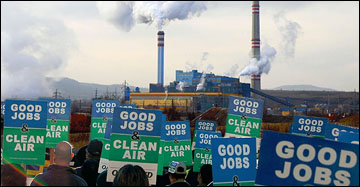OPINION
Time is running out; we must act to save our planet, ourselves
We must go all-in on clean energy to save our environment, our economy, our jobs — and our lives.
By JEFF JOHNSON
“It’s a line in the sand and what it says to our species is that this is the moment and we must act now…” — Debra Roberts, co-chair of the United Nations Intergovernmental Panel on Climate Change
“Today the world’s leading scientific experts collectively reinforced what Mother Nature has made clear — that we need to undergo an urgent and rapid transformation to a global clean energy economy.” — Former U.S. Vice President Al Gore
“If the planet were a bank, we would have already saved it.” — Clara, transit worker in Paris 2015
 (Oct. 18, 2018) — Over the past two weeks, two important reports on climate have come out. The U.S. Environmental Protection Agency released a 500-page report. Buried deep in the report is a projection that temperatures will rise seven degrees Fahrenheit by the end of the century. This is nearly four degrees Celsius, which would dramatically change life as we know it on Earth.
(Oct. 18, 2018) — Over the past two weeks, two important reports on climate have come out. The U.S. Environmental Protection Agency released a 500-page report. Buried deep in the report is a projection that temperatures will rise seven degrees Fahrenheit by the end of the century. This is nearly four degrees Celsius, which would dramatically change life as we know it on Earth.
This level of global warming would create hundreds of millions of water and food refugees, create catastrophic sea level rise, create megastorms and droughts impacting the whole planet and cause the extinction of many species of life.
What has been the Trump administration’s plan of action in the face of such predictions?
► Freeze the Obama administration’s plans on making cars more fuel efficient
► Withdraw California’s ability to set their own carbon emission standards
► Allow states to regulate their own coal power plant emissions
► Relax requirements on how energy companies maintain and repair methane leaks
► Open up the Arctic National Wildlife Refuge to oil and gas drilling
Trump’s plan: double down on fossil fuel production and use.
The other report, released last week by the working group of the United Nations Intergovernmental Panel on Climate Change, noted that Earth’s temperature has already risen one degree Celsius since 1880 and its temperature may well increase another half a degree Celsius by the year 2030 — only 12 years from now.

This means we will be subject to even more severe storms, droughts, flooding, sea level rise, loss of lives, property, and jobs, and political and economic demands arising from forced migration around the world.
But the U.N. Report also is hopeful. While pointing out that keeping the planet at or below 1.5 degrees Celsius is essential and to be successful will require unprecedented shifts to renewable energy systems and transport, “it can be done within the laws of physics and chemistry.”
The question really is one of political will as well as will there be a “just” or an “unjust” transition.
Clara, the transit worker quoted at the top of this article, nailed it. There is no question that there is enough money to make the transition away from fossil fuels, and indeed hundreds of billions of dollars were spent bailing out the world financial system over the last decade at the expense of working people. Her question is, do we value the planet as much as we do the banks?
The leading scientists in the world are telling us that we need to stop arguing over what carbon policy is the best one or whether we get one more mile of highway funding tomorrow and instead go all-in for saving our planet, our economies, our jobs, and our lives.
Of course, how these decisions are made, and by whom, makes a difference. Any policy that significantly lowers carbon emissions, builds high-quality labor standards into renewable energy investments, and provides a “Just Transition” for workers and our communities should be supported.
We can, as Emperor Nero did, fiddle while Rome burns. Or we can accept the clarion call of Mother Earth – “save me to save yourselves.” Or we can sit by and watch her cull the herd.
 Jeff Johnson is President of the Washington State Labor Council, AFL-CIO, the largest labor organization in the Evergreen State, representing the interests of more than 600 local unions and 450,000 rank-and-file union members.
Jeff Johnson is President of the Washington State Labor Council, AFL-CIO, the largest labor organization in the Evergreen State, representing the interests of more than 600 local unions and 450,000 rank-and-file union members.





